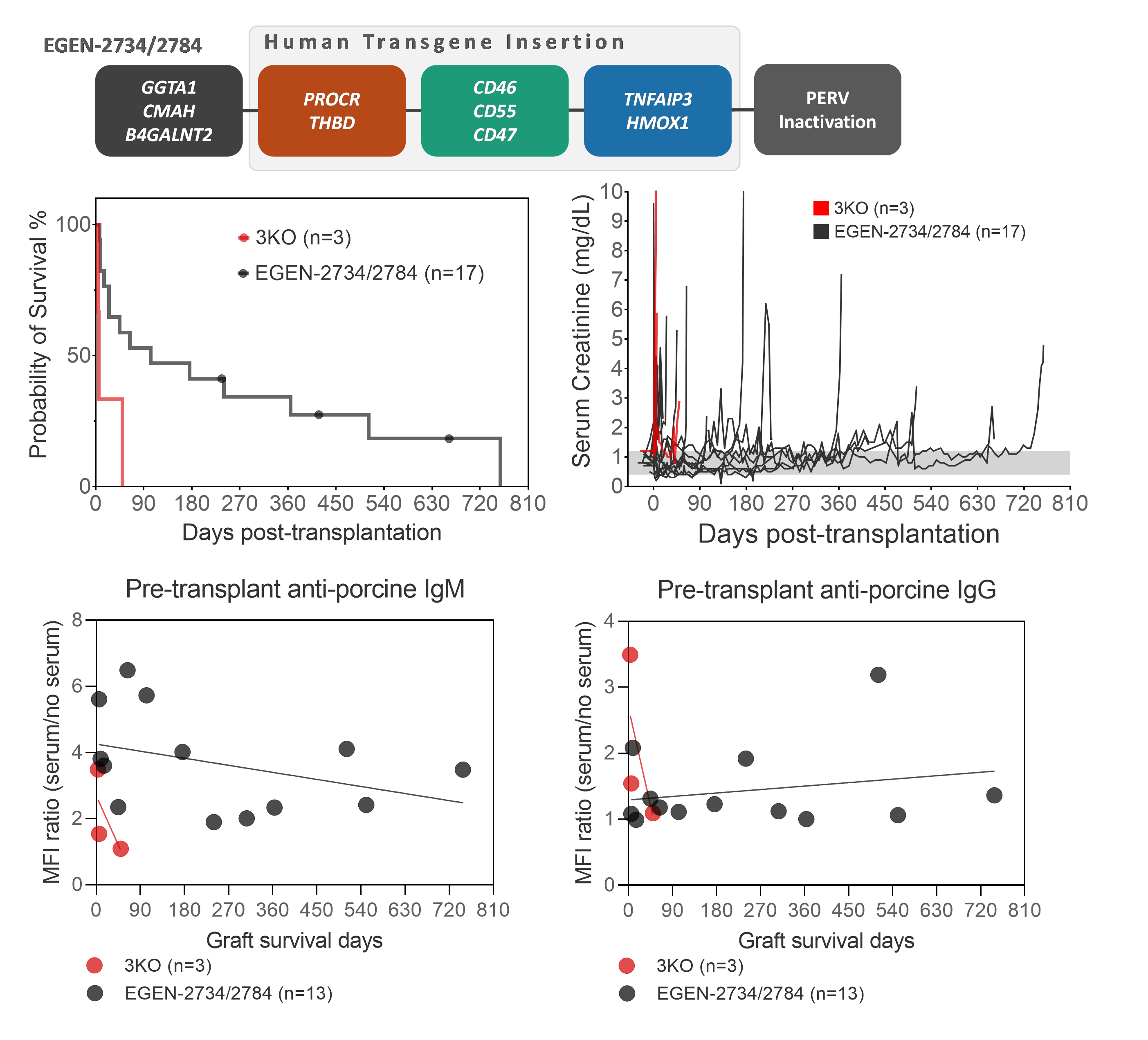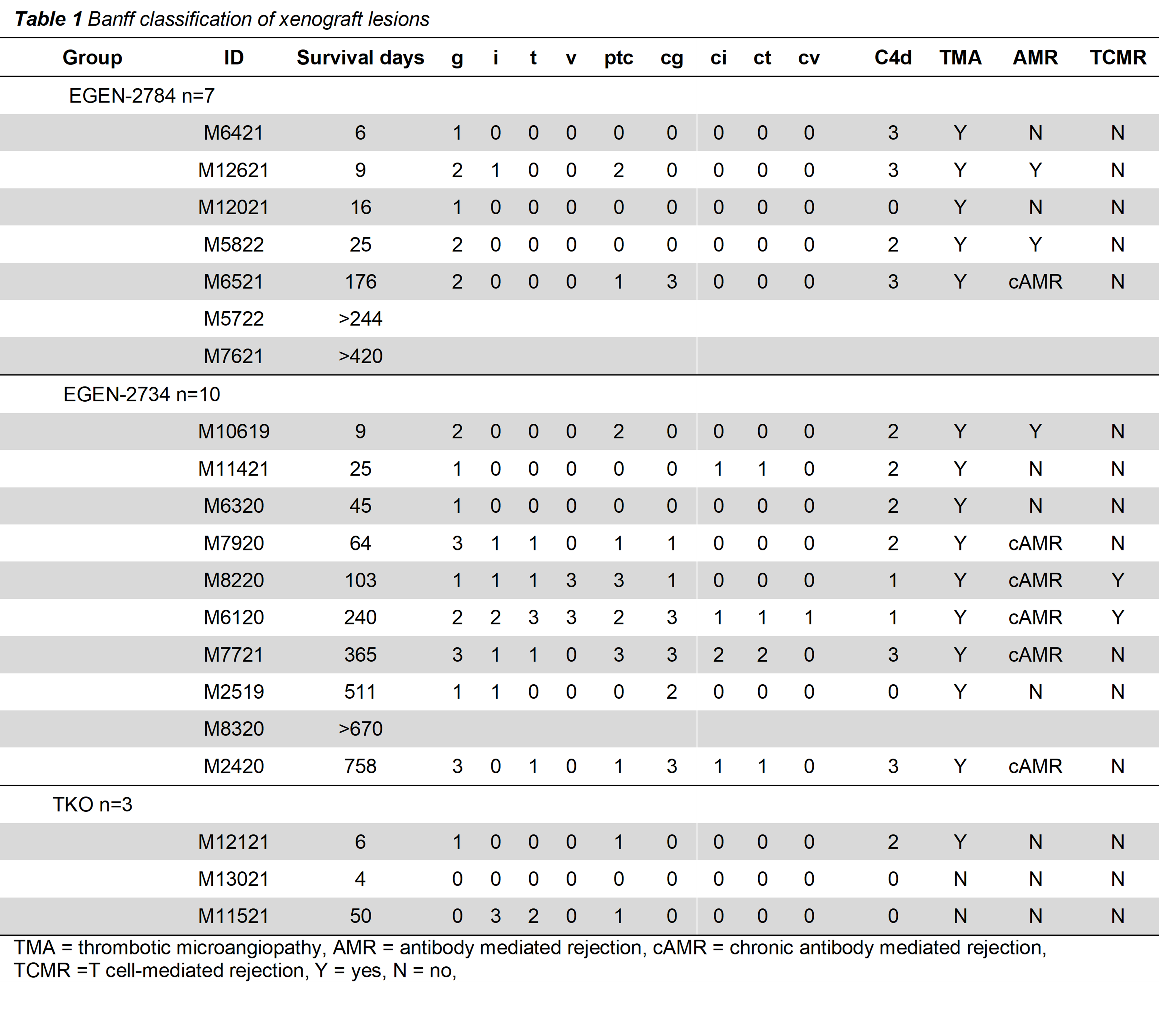Ahmad Karadagi, United States has been granted the eGenesis Young Investigator Award
Long-term (2 years) survival of porcine to nonhuman primate life-sustaining kidney xenotransplantation
Ahmad Karadagi1, Takayuki Hirose1, Ivy A Rosales1, Grace Lassiter1, Toshihide Tomosugi1, Ryo Otsuka1, Daniel Firl1,2, Ranjith Anand2, David Heja2, Jacob Layer2, Susan Low2, Eliezer Katz2, Michael Curtis2, Wenning Qin2, Michele Youd2, Tatsuo Kawai1.
1Center for Transplantation Sciences, Massachusetts General Hospital and Harvard Medical School, Boston, MA, United States; 2eGenesis Inc., Cambridge, MA, United States
Introduction: Xenotransplantation holds immense potential as replacement therapy for end-stage renal disease and a solution to the global organ shortage. Development of porcine xenografts with triple knockouts (3KO) of known xenoantigens (GGTA1, CMAH, B4GALNT2) have partly mitigated the hyperacute rejection by natural antibodies to unmodified porcine organs1.
Transgenic expression of human transgenes has further considerably improved xenograft survival by overcoming the molecular incompatibilities between pigs and humans2.
Methods: 3KO donors (n=3), and 3KO donors also expressing selected human transgenes that control complement (CD46 and CD55), coagulation (THBD and PROCR), innate immunity (CD47), and inflammation (TNFAIP3, and HMOX1) were produced by eGenesis (EGEN-2734, n=10; EGEN-2784, n=7) on a Yucatan miniature swine background.
EGEN-2784 expresses the same human transgenes with additional retroviral inactivation to minimize the possible zoonosis risk of porcine endogenous retroviral elements (Figure 1)3,4.
Life-sustaining kidney transplantation was performed in cynomolgus macaques using these genetically modified porcine grafts to evaluate the addition of human transgenes.
T and B cell depletion was followed by a corticosteroid taper and short course of tacrolimus. Immunosuppression was maintained with anti-CD154 monoclonal antibody +/- mycophenolate mofetil. Pre-transplant IgG/IgM antibodies binding to porcine endothelial cells were surveyed by flow cytometry.
Results: Recipient survival was significantly increased using donor organs expressing human transgenes compared to 3KO only grafts (median, 103 vs. 6 days, p=0.001, Log-rank) (Figure 1). Pre-transplant anti-porcine titers showed no correlation to survival, long-term animals, including >2 year surviving animal showed high comparative pre-transplant IgM binding. The major cause of the early (<60 days) graft loss was thrombotic microangiopathy (TMA). Biopsies from three recipients currently in progress on >244, >420 and >670 days showed no rejection or TMA. Four other long-term (>240 days) survivors also showed no rejection/TMA until close to the graft loss which was due to rapidly developed antibody-mediated rejection (AMR) and TMA. In contrast to allotransplantation, in which T cell-mediated rejection (TCMR) is the major pathology, TCMR was observed in only two EGEN-2734 recipients after reduction of anti-CD154 mAb dose (Table 1).

Conclusions: Life-sustaining renal xenograft survival exceeding two years was achieved in cynomolgus macaques using triple knock-out (3KO) porcine kidneys expressing seven human transgenes.
Although the outcome is heterogenous, pre-transplant anti-porcine antibody titer binding do not correlate with clinical outcome. Less xenograft damage in early rejection might indicate complement activation and protein incompatibilities as causes for graft dysfunction, which may suggest further modifications of transgenes may be necessary to improve the consistency of the results.

[1] D. K. Cooper, A. H. Good, E. Koren, R. Oriol, A. J. Malcolm, R. M. Ippolito, F. A. Neethling, Y. Ye, E. Romano, N. Zuhdi, Identification of alpha-galactosyl and other carbohydrate epitopes that are bound by human anti-pig antibodies: relevance to discordant xenografting in man. Transpl Immunol. 1, 198–205 (1993).
[2] Ma, D., Hirose, T., Lassiter, G., Sasaki, H., Rosales, I., Coe, T. M., Rickert, C. G., Matheson, R., Colvin, R. B., Qin, W., Kan, Y., Layer, J. v., Paragas, V. B., Stiede, K., Hall, K. C., Youd, M. E., Queiroz, L. M., Westlin, W. F., Curtis, M., … Kawai, T. (2022). Kidney transplantation from triple-knockout pigs expressing multiple human proteins in cynomolgus macaques. American Journal of Transplantation, 22(1), 46–57.
[3] C. Patience, Y. Takeuchi, R. A. Weiss, Infection of human cells by an endogenous retrovirus of pigs. Nature medicine. 3, 282–6 (1997).
[4] D. Niu, H.-J. Wei, L. Lin, H. George, T. Wang, I.-H. Lee, H.-Y. Zhao, Y. Wang, Y. Kan, E. Shrock, E. Lesha, G. Wang, Y. Luo, Y. Qing, D. Jiao, H. Zhao, X. Zhou, S. Wang, H. Wei, M. Güell, G. M. Church, L. Yang, Inactivation of porcine endogenous retrovirus in pigs using CRISPR-Cas9. Science. 357, 1303–1307 (2017).